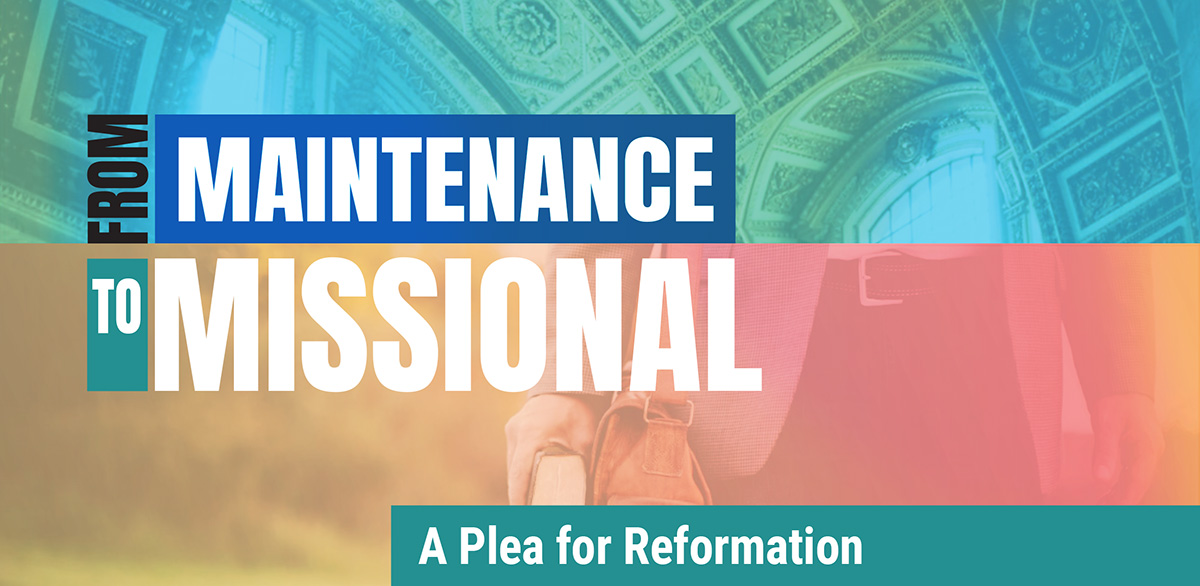This is the first article in a new series entitled From Maintenance to Missional. The title might perplex some readers, so allow me to state at the outset my intentions. Conversion growth in Presbyterian and Reformed churches is virtually nonexistent. In my opinion that should, can, and must change. Hence this call for reformation in the mission of the church.

What is meant by the terms “maintenance” and “missional” with respect to the church? Allow me to illustrate the term “maintenance” with a story. Many years ago, I served a church in the Midwest. I discovered that a fellow NAPARC denomination had plans to plant a church less than a quarter mile away from where I served. I was surprised and somewhat perplexed by this because of what we read in Romans 15:20 (New International Version): “It has always been my ambition to preach the gospel where Christ was not known, so that I would not be building on someone else’s foundation.” This is something agreed upon by NAPARC churches.
I called the person responsible for that effort and introduced myself as the pastor of an existing church in the same neighborhood. I said, “I thought I should call because I’m wondering why you’re starting a new church when there is an existing Reformed church next door?” His response was that his was going to be a different kind of church, an outreach church while we were a maintenance church. I replied that I thought every church was to be an outreach church, reaching the lost in the community.
It was the first time I heard that language of a maintenance church used. He explained to me that ours was a church that had been in the community for generations, an established church (as we might refer to it). They were going to be all about reaching those in the community who are lost. In my experience that distinction in nomenclature has become standardized in Reformedville and elsewhere. A church is either a maintenance or a missional church (whose primary purpose is outreach). While it may accurately reflect the current situation, I suggest it is a lamentable and problematic distinction, one in need of a remedy. The remedy should come about by a reformation of mission.
Typically, in a maintenance church evangelism and outreach is one of many other ministries in the church. There is the preaching ministry, diaconal ministry, and numerous others. But evangelism and outreach (seeking and saving the lost) is but one of numerous line items on the church’s budget of ministries. In my experience, and I travel the country visiting our North American churches, evangelism and outreach is either neglected or is relegated to typical programs such as Vacation Bible School, prison ministry, nursing home ministry, and others. That is not to deprecate any of those ministries. They all have value, and the Lord uses all of them and those people devoted to them. Yet there is a lack of intentionality in seeking the lost in the local community. That is a maintenance church.
What do I mean by a missional church? I realize the term has become a buzzword associated with all sorts of causes and defined in various ways. What I do not mean by the term is not just doing evangelism or doing more evangelism, either personal or programmatic. It is not just doing more of what may have been done. Nor is it more missionaries or more staff to conduct evangelism. Nor am I talking about a method of doing evangelism. Rather I am talking about something that is essentially theological. Being a missional church is to be a church where evangelism, outreach, mission is the identity of the church. It is not one among many aspects of the church’s life. Mission is to be the raison d’etre of the church, the reason for which it exists.
Consider what we hear in Acts 1:8: “You [plural] will be my witnesses.” And then the field of mission is to be “in Jerusalem, and in all Judea and Samaria, and to the ends of the earth.”1 Note that the first part of the verse is not a command, an imperative. Rather it is an indicative, that is, being Christ’s witnesses is not something one does but is something one is, one’s identity. A comparable passage is Matthew 5, where disciples are told they are the light of the world and the salt of the earth. Those are being, not doing, statements of identity. Christians are to be the witness.
What that means is that evangelism and outreach to the lost is not an add-on to the life of the church. It is not just a line item on the budget. It is not one among many ministries. It is the reason the church exists. It is the church’s identity.
What is the mission of the church? It is to make disciples by proclaiming the gospel. But, returning to the assertion at the beginning of this article, conversion growth in our churches is virtually nonexistent. We must move from maintenance to missional. Ecclesia Reformata, semper reformanda.2
1 One of many ways in which the book of Acts can be outlined is geographically. 2 The Reformed church is always reforming.
Rev. Paul T. Murphy is the emeritus pastor of Messiah’s Reformed Fellowship in New York City. He has been asked to stay on as a full-time evangelist for the congregation.
